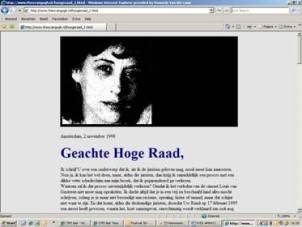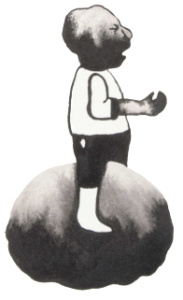A discussion of the Van Gasteren / Hemelrijk judgment of the Dutch Supreme Court dated 18 January 2008
Background
On 24 May 1943 movie maker Van Gasteren killed Walter Oettinger, the Jewish person who had been hiding in his house in Amsterdam since 19 May 1943. In 1944 Van Gasteren was sentenced to a term of four years’ imprisonment for manslaughter. After the war Van Gasteren was granted a pardon. Van Gasteren himself has stated that the killing of Oettinger was an act of resistance, because Oeottinger was life-threatening for various persons. This topic has caused a public discussion that still continues to date.
In 1990 journalist Bart Middelburg wrote in Het Parool on the subject. Those publications contain doubts on the true motives of the liquidation. The Supreme Court finds that the publications contain an implicit accusation that Van Gasteren had committed “a (common) robbery and murder”. In a judgment dated 6 January 1995 the Supreme Court concludes that the publications were unlawful towards Van Gasteren. The affair did not end with this judgment of the Supreme Court. In legal proceedings instituted by Van Gasteren, the Central Appeals Tribunal ruled in 1997 that the killing of Oettinger was not an act of resistance within the meaning of the Extraordinary Pension Act (Wet buitengewoon pensioen (“WBP”)), so that the pension that Van Gasteren had applied for had been rightfully refused. A few months later, in a portrait about him in the NPS television program “het Uur van de Wolf”, Van Gasteren repeated that the liquidation had been necessary in the interest of the resistance.
Open Letter on the Internet
On 2 November 1999 journalist Pamela Hemelrijk published an “Open Letter to the Supreme Court” on the Internet, which begins as follows:

“Dear Supreme Court,
I am writing to you on a subject matter which, if I may believe the lawyers, I can never mention again. Well, I may do so but, according to these lawyers, I will immediately be sued for enormous damages, which case I am definitely going to lose. Why am I bound to lose this case? Because I am not allowed to drag up the past of movie maker Louis van Gasteren anymore. …………Strangely enough, Louis himself can drag up his past as much as he likes ……”
In the letter Hemelrijk expressed her doubts about Van Gasteren’s statement that he was a member of the resistance and that the liquidation was a result thereof.
“I know better than to speculate about Van Gasteren’s real motives to kill this person in hiding. It is an established fact, though, that this person in hiding owned a small fortune of money, which he carried with him day and night ……. Just like me, the Supreme Court is also aware that shortly after the murder witnesses have seen Louis with a large amount of money, which looked like it had been in the water. If I remember well, he was busy hanging the bank notes out to dry. But I am not going to speculate about Louis van Gasteren’s real motives. I know better than that. Let the readers draw their own conclusions …”
In 2001 Van Gasteren summoned Hemelrijk to appear in court. He argued that Hemelrijk acted unlawfully by repeating allegations which the Supreme Court had found unlawful in the Het Parool judgment. Hemelrijk was represented by Kennedy Van der Laan’s Eberhard van der Laan.
Pending the appeal proceedings in 2005, the WBP Chamber of the Pension and Benefits Board confirmed that Van Gasteren’s pension application had been rightfully refused.
Supreme court Ruling
The Supreme Court has balanced two fundamental rights. On the one hand the freedom of expression and on the other hand the right to a person’s honor and reputation and the respect for his privacy. The Supreme Court ruled, just like the Court and the Court of Appeal, that Hemelrijk’s freedom of expression prevailed, and denied Van Gasteren’s claims. The judgment contains a number of fundamental statements.
Is a Blogger a Journalist?
Did the open letter fall under the scope of the freedom of press? Pursuant to established case law of the European Court of Human Rights, the press has a special position as a public watchdog. The Supreme Court argued that partly because of the rise of the Internet no exact definition of press can be given. Nowadays, private persons can also easily address the public. With the open letter Hemelrijk addressed a very wide audience and expressed her doubts about the act of resistance claimed by Van Gasteren. Hemelrijk acted in the public interest and the Court of Appeal has rightfully put the private online letter on a par with a press publication.
Opinion vs. facts
The next question was whether the open letter could be put on a par with a column. It is generally accepted in case law that columns have to meet less strict requirements than normal publications. A column justifies stronger wordings, the blowing up of a topic and a simplifying approach. The Supreme Court not only confirmed this principle, but extended it to opinion-forming publications in general. In the view of the Supreme Court, it is not the label “column” but the contents that matter.
Claimant Who Encourages Public Discussion on His Own Acts Gives Press more Leeway to Report on Him
The Supreme Court furthermore stated that it is relevant that Van Gasteren once again sought publicity himself in “het Uur van de Wolf” and wrongfully created the impression that he had been rehabilitated. The Court of Appeal rightfully considered that there were compelling reasons of public interest which justified that the open letter was brought to the attention of the public. Next, the Supreme Court emphasized that the question whether or not these compelling reasons were actually a pre-requisite to justify the open letter need not be commented on because the open letter – unlike what the Supreme Court had read implicitly in the Parool publications – contains no accusation of murder and robbery and Van Gasteren’s resistance claim is only “exposed in a cynical and provocative manner”.
Conclusion
This judgment provides a boost for the freedom of the press. First of all by its acknowledgment of the more flexible regime for columns and by the inclusion of opinion-forming publications in general in that regime. Furthermore, I think the Supreme Court has rightfully refused to give an exact definition of “the press”. This is a topical matter because many people, including the current Minister of Justice, argue that the codification of the right of journalists to nondisclosure requires a definition of “journalist”, which will probably result in an unnecessarily strict definition. This judgment gives people who support the codification of the right of nondisclosure, but oppose an exact definition of the term “journalist” a strong lobby tool. If there is a discussion on who is a journalist, it should be left up the courts to decide. For more information on this topic, I refer to the contribution in the previous newsletter about the Voskuil judgment.

